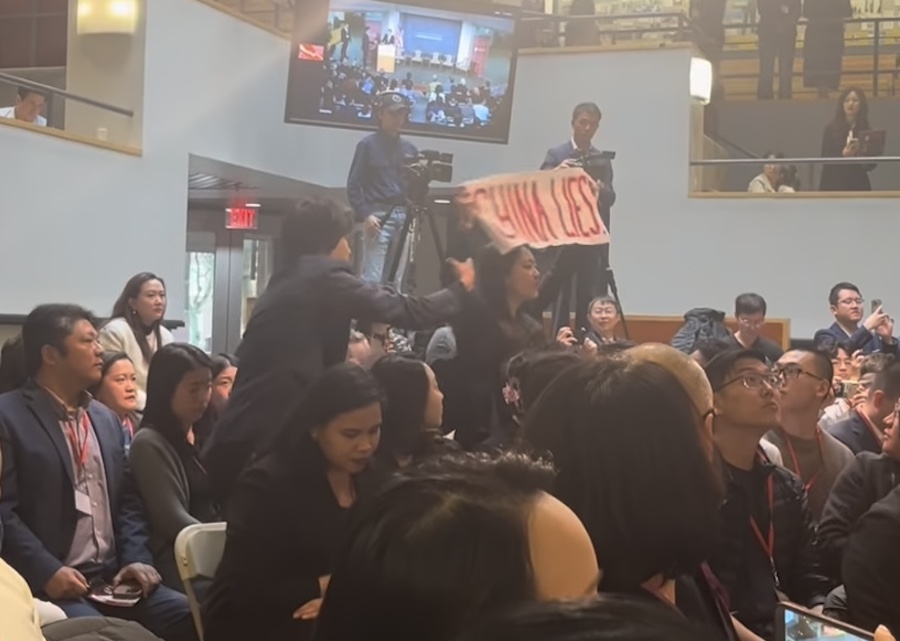 By Caryle Murphy
By Caryle Murphy
Washington Post Staff Writer
Sara Smith gave a “feather blessing” and called upon her Native American ancestors. Rabbi Laura Geller recited from the Jewish mourning prayer. Sana Afandi chanted the opening verse of Islam’s holy book. And Mae Chee Sansanee, a Buddhist nun, led a group meditation.
Those religious figures and a dozen more were among 250 women who gathered yesterday in the ballroom of a District hotel for that most venerable of Washington traditions: the power breakfast.
Except this breakfast was about a different kind of power: that of prayer.
Organizers of the first Women’s Prayer Breakfast for Peace said they intend to tap female leaders in business, government and religion around the world to build an international, interfaith women’s movement to lobby against war from a religious perspective.
“We plan to bring this on the road,” said Dena Merriam of New York, an official with the breakfast’s sponsor, the Global Peace Initiative of Women Religious and Spiritual Leaders. “We believe it’s time to . . . call attention to the fact that the voices of women are being left out of the decision-making process.”
More than a score of foreign embassies sent representatives to the breakfast, which was another example of a trend toward interfaith activities. Other participants included two elderly Tibetan nuns, a Benedictine prioress from Pennsylvania, an American Baptist and representatives of Hinduism and the Inca tradition.
Virginia Williams, mother of D.C. Mayor Anthony A. Williams (D), greeted the women and sang “Amazing Grace.” The atmosphere at the Willard Hotel was mellow, as the women lowered their heads and closed their eyes in prayer, sometimes holding hands.
But there also was a sense of urgency about the event — scheduled long before the current U.S. military buildup in the Middle East — because of the anticipated war with Iraq.
“When we set the date for this prayer breakfast, we had no idea of just how significant this moment would be,” said the Rev. Joan Brown Campbell, co-chair of the Global Peace Initiative and former executive director of the U.S. Office of the World Council of Churches.
“We are told that time is running out, that patience is in short supply,” Campbell added. “But we would ask the question, ‘Have we no time for peace to work its wonder? Have we no patience for prayers to be offered?’ ”
Among the speakers was Charlotte Ponticelli, deputy senior coordinator for international women’s issues at the U.S. State Department, who told the women that the Bush administration sees “respect for women” as one of the “nonnegotiable demands of human dignity.” She also said that “women must be viewed not merely as victims but as key players in preventing and resolving conflict.”
Her remarks received only tepid applause. The reaction was far more enthusiastic for Marian Wright Edelman, president of the Children’s Defense Fund. Edelmen urged the women to “speak up for new choices, for peace.” She added that “the basic problem in this country is that we make a distinction between our children and children in other countries.”
Edelman said women should take civil rights legend Rosa Parks as a role model. She reminded them that Parks had “to sit down to get Dr. King to stand up,” referring to the Rev. Martin Luther King Jr. and the Montgomery, Ala., bus boycott.
Colleen Kelly, whose brother Bill was killed in the 2001 attack on the World Trade Center, represented September 11 Families for Peaceful Tomorrows at the breakfast. “Women have this vested interest in peace,” said Kelly, who lives in the Bronx, N.Y. “I do feel women can make a true difference.”
But some were not so sure. Rene Boni, a Bethesda singer who offered a Jewish call to prayer at the breakfast, said she did not know how much of an effect such a gathering could have. “I think people feel that because of their religious commitment, we’re all of a human family and that it would be wrong not to speak out,” Boni said.
“I’m worried about bioterrorism, but I can’t help think if there isn’t a better way,” she added. “I keep thinking about John Lennon’s song, ‘Give Peace a Chance.’ ”
Absent from the breakfast were Christian evangelicals. Campbell said that organizers had invited someone to represent evangelicals but that the person was unable to attend.









